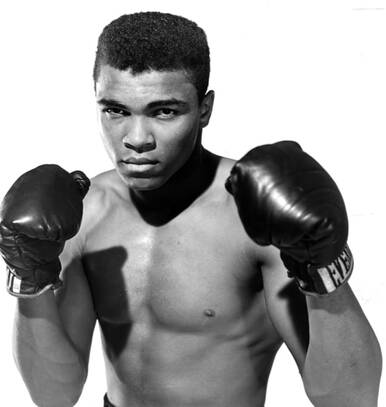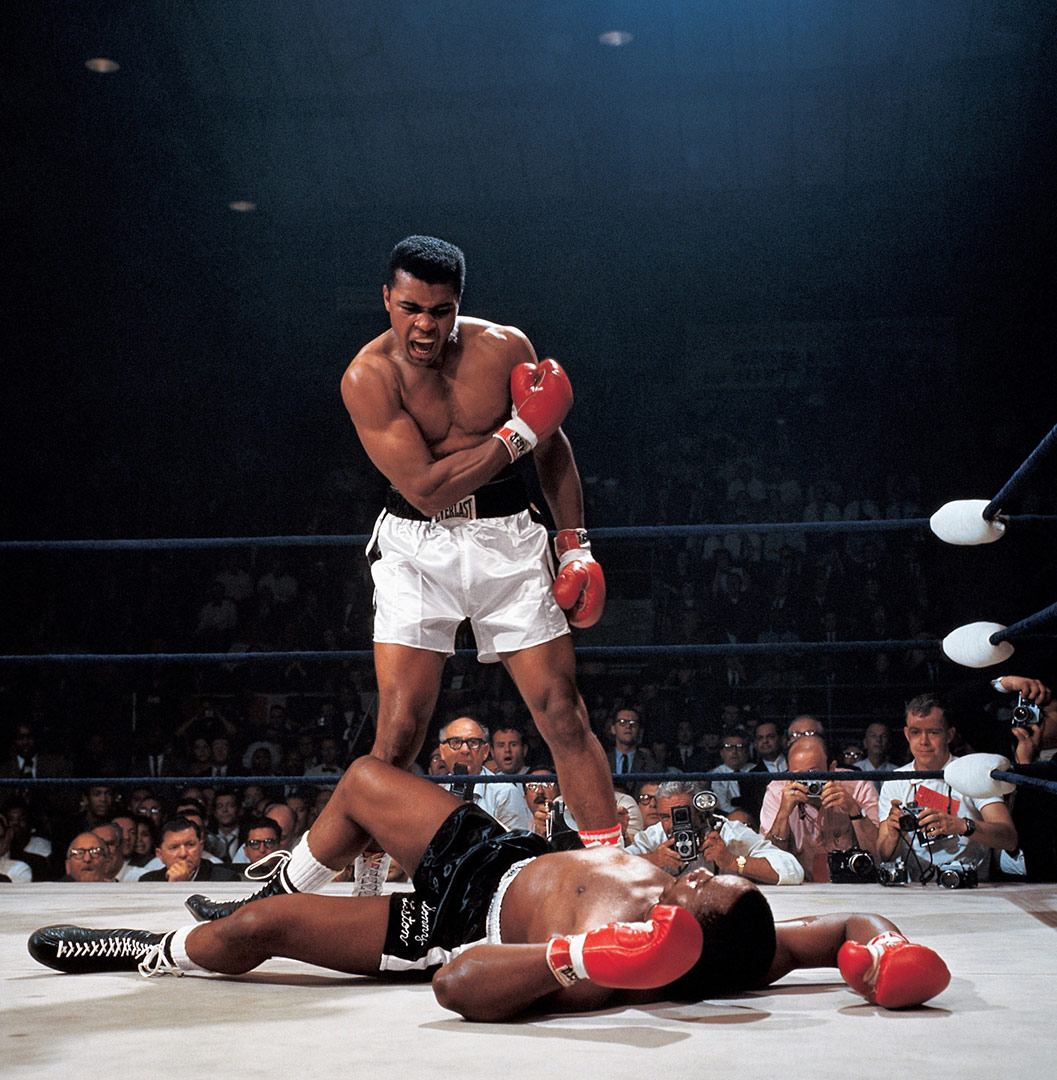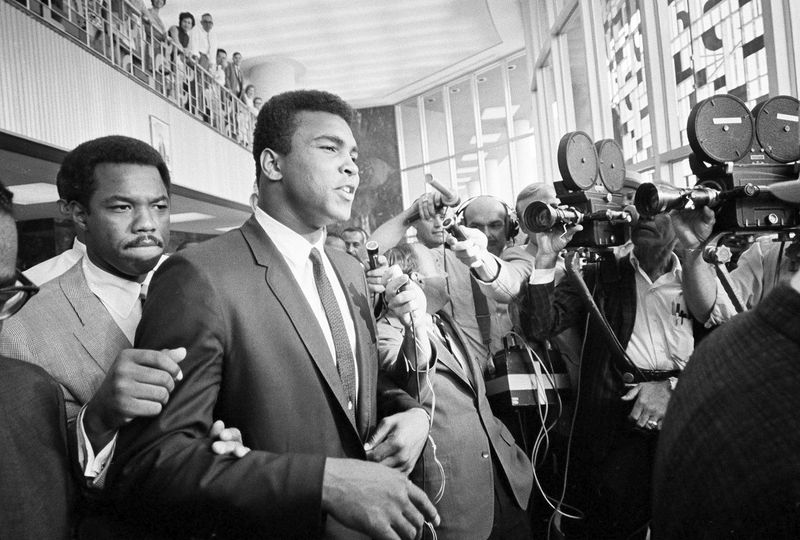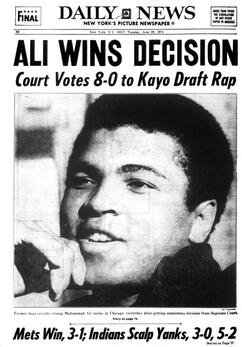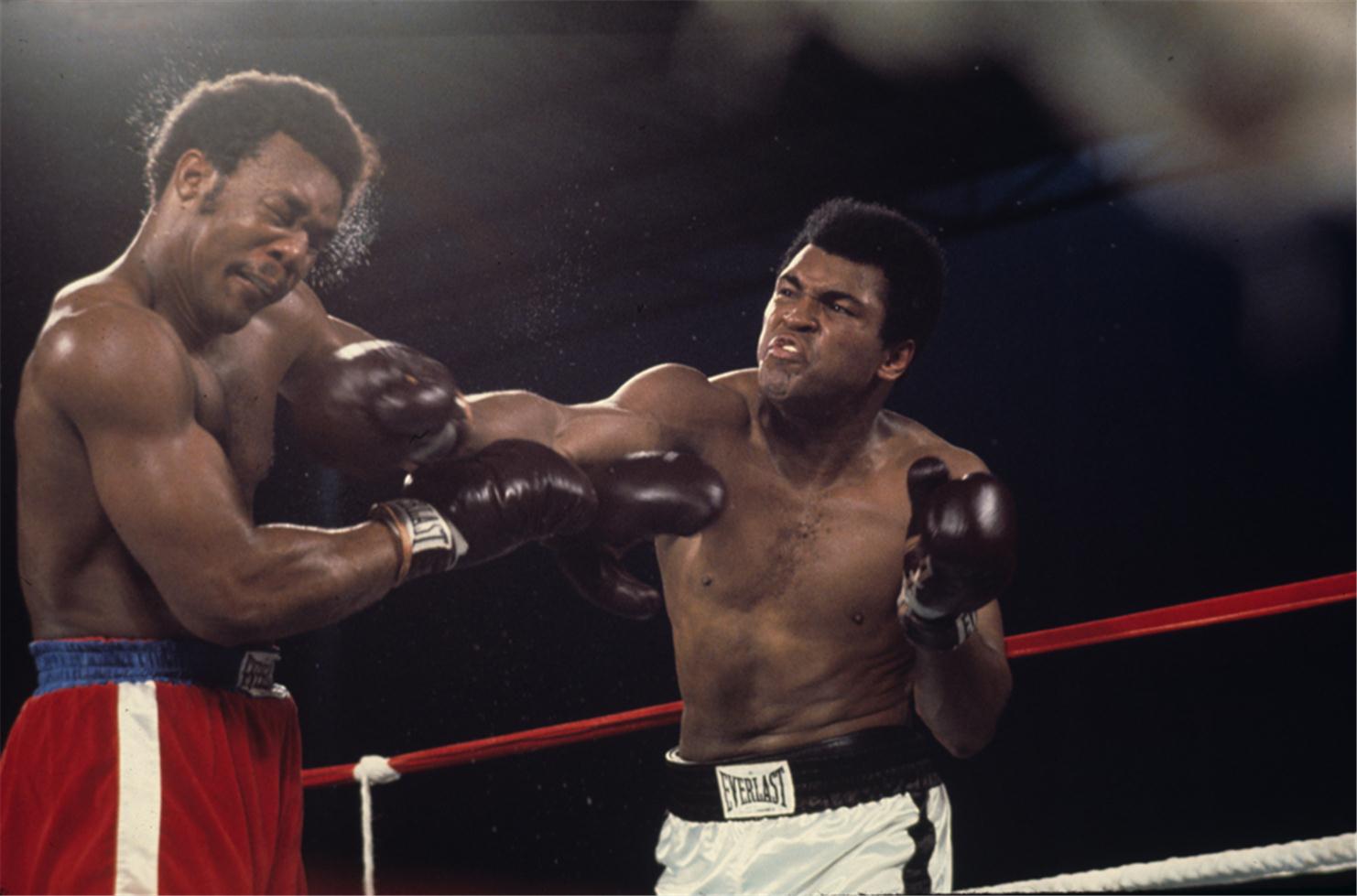|
Muhammad Ali was born as Cassius Marcellus Clay Jr. on January 17, 1942, in Lousiville Kentucky. He began training as a boxer at the age of 12. When he was 18, he won a gold medal in the light heavyweight division at the 1960 Summer Olympics. After winning, he became a professional fighter later that year. In 1961, he converted to Islam and became a Muslim. He then changed his name from Cassius Marcellus Clay Jr. to Muhammad Ali. In 1964, Muhammad Ali pulled off a major upset against Sonny Liston and was crowned the world heavyweight champion at the age of 22. In 1966, Muhammad Ali was drafted into the United States military, but he refused to be drafted. During that time, he told his religious beliefs and opposition to be drafted for the Vietnam War. The Vietnam War was raging and American soldiers were dying by the hundreds. Protesters were burning draft cards and were fleeing to Canada in order not to be drafted. Muhammad however, had no intention of fleeing to Canada, but he also had no intention of serving in the military. He said, “I ain’t got no quarrel with them, Viet Cong. My conscience won’t let me go shoot my brother, or some darker people, or some poor hungry people in the mud for big powerful America, and shoot them for what? They never called me nigger, they never lynched me, they didn’t put no dogs on me, they didn’t rob me of my nationality, rape and kill my mother and father… Shoot them for what? How can I shoot them, poor people? Just take me to jail.” On April 28, 1967, Muhammad Ali arrived at the Armed Forces Induction Center in Houston. In the induction center, Muhammad Ali was called to step forward by his birth name, Cassius Clay. He refused to step forward because he is a Mulsim convert and had changed his name to Muhammad Ali. He was called to step forward again by his birth name by the lieutenant. He again refused to step forward and appear outside the induction center within a couple of minutes. When he was outside, reporters wanted him to hand out a statement. He then said, “It is in the light of my consciousness as a Muslim minister and my own personal convictions that I take my stand in rejecting the call to be inducted... I find I cannot be true to my beliefs in my religion by accepting such a call. I am dependent upon Allah as the final judge of those actions brought about by my own conscience.” Later that day, Muhammad Ali was stripped of his boxing license and was not allowed to fight again. On June 20, 1967, Muhammad Ali was arrested and convicted by a Houston jury of a felony charge of violating the Universal Military Training and Service Act. A federal district judge Joe E. Ingraham sentenced Muhammad Ali to five years in prison and a fine of $10,000. Over the next four years, he appealed the decision to the Supreme Court, which overturned his conviction in 1971. He hadn’t fought in four years and had lost his period of peak performance. Muhammad Ali became an antiwar and civil rights hero as he made speeches on university campuses and to the world. He spoke to a crowd of college antiwar protesters and said, “It has been said that I have two alternatives, either go to jail or go to the army. But I would like to say that there is another alternative. And that alternative, that alternative is justice. And if justice prevails, I will neither go to the army nor will I go to jail.” He gathered a lot of protesters and people were behind his back. Martin Luther King Jr. was one of them and he praised Muhammed Ali’s decision to become a conscientious objector. Muhammad Ali’s boxing license was restored in 1970. After two fights, Ali sought to regain his heavyweight title from the new champion, Joe Frazier, at the Madison Square Garden on March 8, 1971. Each boxer was guaranteed at least $2.5 million, which is the highest pay for any athlete up to that time. Unfortunately, Muhammed Ali was knocked down by Frazier in the 15th and final round and won the fight by unanimous decision. On April 23, 1971, the justices decided that Ali was not a conscientious objector in a 5-3 vote and made the decision to send him to prison. Harlen’s clerk was convinced that Muhammad was opposed to all wars and was a true conscientious objector. The clerk then convinced Justice Harlan to reconsider the case. After reviewing the case and papers, Harlan announced that he was convinced that the government had painted Muhammad as “a racist, misinterpreting the doctrine of the Black Muslims despite the Justice Department’s own hearing examiner’s finding that Ali was sincerely opposed to all wars.” On June 28, 1971, all justices and Chief Justice Burger agreed to overturn Muhammed Ali’s conviction. In January 1971, Muhammad Ali defeated Joe Frazier. He then challenged George Foreman, who was the reigning heavyweight champion. The match was called “Rumble in the Jungle” because it was held in Zaire. In the eighth round, Muhammed Ali knocked out Foreman. His knockout victory was considered miraculous and took on symbolic importance because it took place on African soil. Muhammad Ali was a professional boxer, activist, and philanthropist who made a huge impact on the justice system and the civil rights movement. Muhammad Ali died on June 3, 2016.
|
|
Works cited
Barra, Allen. “Muhammad Ali's Most Formidable Opponent Was the U.S. Supreme Court.” The Atlantic, Atlantic Media Company, 4 Oct. 2013, www.theatlantic.com/entertainment/archive/2013/10/muhammad-alis-most-formidable-opponent-was-the-us-supreme-court/280280/.
Bomboy, Scott. “The Supreme Court Decision That Saved Muhammad Ali's Boxing Career.” National Constitution Center – Constitutioncenter.org, 4 June 2016, constitutioncenter.org/blog/alie28099s-supreme-court-decision-was-biggest-victory.
Brown, DeNeen L. “'Shoot Them for What?' How Muhammad Ali Won His Greatest Fight.” The Washington Post, WP Company, 31 July 2019, www.washingtonpost.com/news/retropolis/wp/2018/06/15/shoot-them-for-what-how-muhammad-ali-won-his-greatest-fight/.
Klein, Christopher. “Muhammad Ali vs. the United States of America.” History.com, A&E Television Networks, 28 Apr. 2017, www.history.com/news/muhammad-ali-vs-the-united-states-of-america.
Wolfson, Andrew. “Muhammad Ali Lost Everything in Opposing the Vietnam War. But in 1968, He Triumphed.” USA Today, Gannett Satellite Information Network, 2 Mar. 2018, www.usatoday.com/story/news/2018/02/19/1968-project-muhammad-ali-vietnam-war/334759002/.
Bomboy, Scott. “The Supreme Court Decision That Saved Muhammad Ali's Boxing Career.” National Constitution Center – Constitutioncenter.org, 4 June 2016, constitutioncenter.org/blog/alie28099s-supreme-court-decision-was-biggest-victory.
Brown, DeNeen L. “'Shoot Them for What?' How Muhammad Ali Won His Greatest Fight.” The Washington Post, WP Company, 31 July 2019, www.washingtonpost.com/news/retropolis/wp/2018/06/15/shoot-them-for-what-how-muhammad-ali-won-his-greatest-fight/.
Klein, Christopher. “Muhammad Ali vs. the United States of America.” History.com, A&E Television Networks, 28 Apr. 2017, www.history.com/news/muhammad-ali-vs-the-united-states-of-america.
Wolfson, Andrew. “Muhammad Ali Lost Everything in Opposing the Vietnam War. But in 1968, He Triumphed.” USA Today, Gannett Satellite Information Network, 2 Mar. 2018, www.usatoday.com/story/news/2018/02/19/1968-project-muhammad-ali-vietnam-war/334759002/.
